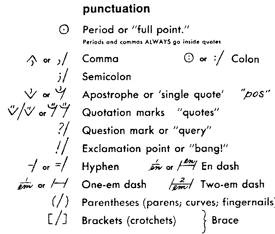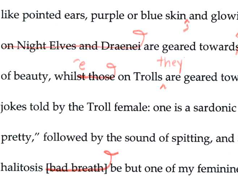

MIT Press sent us the copyedited version of the World of Warcraft Reader last week, so now Hilde and I, and most of the contributors, are going through the manuscript considering all those little red marks. I must say, I’m really impressed with the job the MIT Press copyeditor, Krista Magnuson has done. She’s combined an astounding attention to detail (hey, you didn’t actually refer to this article in your chapter, but you put it in the bibliography. You need a URL for that reference, here it is. You need to spell out numbers like that, but not numbers like this.) with a very fluid ability to make deft little changes to a sentence that make it more understandable and more elegant.
It’s also pretty exciting getting to reread it all a few months after we sent it off. I would have screamed if forced to reread it all back in April, but now Hilde and I are both enjoying rereading. It’s great!
The reader should be out in Spring of 2008.




Mum
Cool, but why would copyeditors still mark up manuscripts like this when they could just edit electronic documents directly & let the authors see all the changes using a ‘track changes’ view? Just curious …..
ahmed
Very cool. I just got into WoW and was thinking of writing something on my experiences. Obviously nothing this exhaustive and multi-dimensional. I even had a title for it: “This World of Warcraft”. Feel free to use it if you wish.
Jill Walker Rettberg
Actually, having used the Word correction tool quite a lot, I think this paper method has a LOT of advantages. Apart from the Word documents sometimes getting corrupted and the file size growing enormous, there’s a different way of reading when things are semi-in-print – you get a kind of blindness to the screen sometimes.
I’m not sure whether they’ll even use the electronic files we sent. In the information for authors from the press, it said that it can cost MORE to adapt electronic files than to retype them in entireity. That’s kind of weird, isn’t it?
Ahmed, you should go ahead and write something!
Warcraft Powerlevel
Here are some WoW leveling tips that you really want to live by whenever you are leveling. It has helped me out a lot since I started playing and I know they will greatly benefit everyone as well.
Tip #1: Stick with a mixture of grinding and questing. One or the other by itself will probably slow down your progress but a nice mixture of both you can achieve the levels you want the fastest. There are tons of guides out there that will show you which quests to do, when to grind, and where to grind. One of my favorite Warcraft Powerlevel Guide.
Tip #2: Grab as many quests as possible whenever in a town and don’t return until they are all completed. This cuts down on travel time and it really is a lot of fun turning in 5-9 quests at the same time!
Tip #3: Stay focused and have a game plan before logging in. For some people this really isn’t a problem but, I know for me and some of my friends, it really can be hard to focus on leveling and I know I have lost many hours of valuable leveling time due to not having a game plan setup before playing. With a plan of action it really is harder to get side tracked by the auction house, PvP, etc.